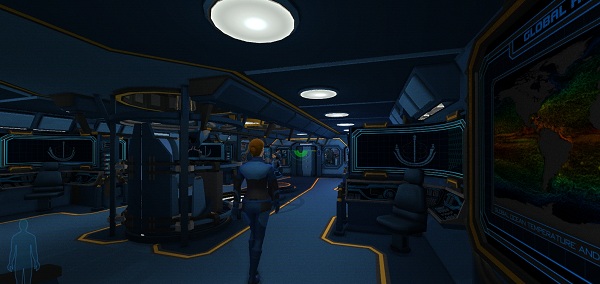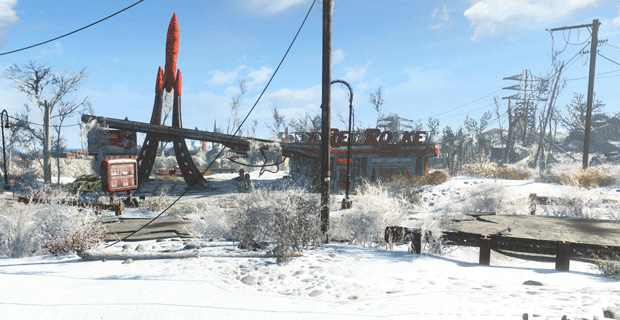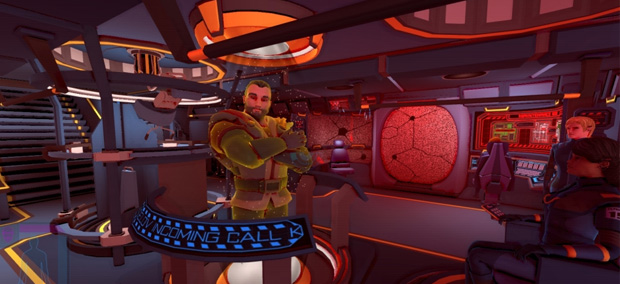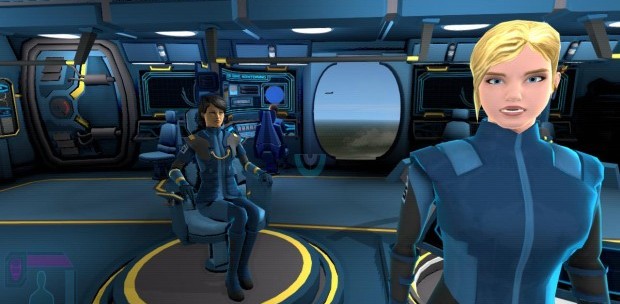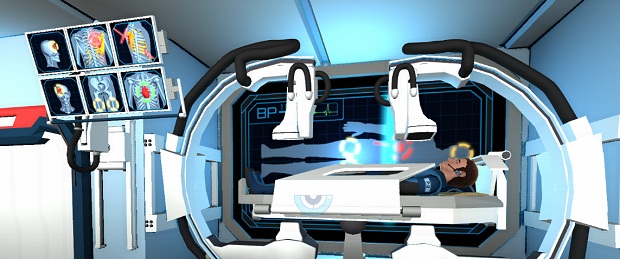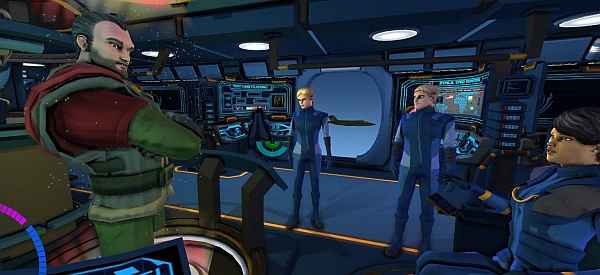Impressions: Consortium
Satellite Of Love
When I first saw Consortium, I wasn't sure what to think. There was fictional science occurring, that much was clear, but to what end? A couple of weeks ago, determined to learn more about this mysterious first-person adventure/RPG, I had the opportunity to play an early build and came away filled with wisdom and excitement. Now that the project is back on Kickstarter, I shall share both. From what I've played, Consortium shows itself to be a tight experience, heavy on communication and choice, and riddled with the unexpected. But what exactly is it?
Consortium’s first Kickstarter attempt was a long way from reaching its goal when Interdimensional pulled the plug around the mid-way point, recognising the need for a possible change in strategy and a stronger opening fortnight. The project had failed to receive a great deal of attention and that’s at least partly because it looks like something that it isn’t. Superficially, the game resembles a space opera with RPG elements and lots of talking, similar to the Mass Effect series but without the blue aliens, or the Hollywood spit and polish.
The surface doesn’t lie but it does equivocate somewhat. Consortium does put the player in charge of a crew and various alternate future missions, but there is much more emphasis on the relationships between individual crew members, who all resemble human beings, but find variety in their voices and personalities. The writing detours around many of the sci-fi tropes that it seems to be heading straight toward, but all of that is only evident upon playing.
It’s incredibly difficult to convince a potential audience of a project’s worth when so much of the claims are based around the quality of the writing and the world-building. Samples won’t necessarily be a great deal of help, particularly when taken out of context, and strong characterisation takes time to develop throughout a story. I’ve played the first few hours and found the world instantly fascinating. It has the beginnings of a fascinating science fiction adventure, with heavy touches of mystery and meta-fiction. But let’s briefly go back to where all of this started.
Consortium began with an ARG and you can still see all of the content produced during its run, in chronological order, by popping over to Interdimensional and selecting ‘experience’. I haven’t played through the whole thing but even a quick visit reveals an enormous amount of backstory, technical lore and the same sort of slightly offbeat storytelling as seen in the game.
During the game, the player is not the commander of the ship they find themselves on, not exactly, partly because the hierarchy of the crew isn’t as precise as you might imagine, but also because the player is the player. Except in the future. You are, essentially, you; a person sitting in front of a computer connected to another world, except that the game’s conceit is that the world you connect to is real, rather than a game, and events have actual consequences in that world. You can tell other characters that your avatar, known as Bishop 6, is simply a puppet and that you’re controlling it from another time and place. Some of them seem concerned about your mental stability while others laugh it off as a joke.
Occasionally, they question you, trying to dig deeper, which is disconcerting because in those situations, the fourth wall doesn’t so much creak as turn into a window. The opening of the game is entirely peculiar. Following a tutorial that is reminiscent of System Shock 2 due to its simple physical manipulation, inventory management, functional shooting and VR training setting, Consortium drops you onto a ship and introduces you to the crew and becomes a first-person exploration and conversation simulator.
Approaching any member of the crew allows you to click on and speak to them. They’ll carry on talking if you walk away but reach a certain distance and they’ll shut up, occasionally acknowledging your lack of etiquette the next time you pass by, avoiding their gaze and pretending to be on the phone or cleaning your gun. Conversations branch based on your choices and while some are dramatic or informative, others have a brisk banality to them that makes the crew seem more convincingly alive than your usual group of gung-ho space-bastards.
They know your role but they don’t know you – you’re a replacement for the previous Bishop and everybody would like to meet you. Wait, that’s not quite right. You’re not actually a replacement Bishop, you’re a person sitting in front of a computer controlling the physical entity that is replacing the previous Bishop. It’s not a particularly complex concept but the game doesn’t let up, with constant reminders of the weird and potentially hazardous edges around the situation.
By drawing such blatant attention to the artificial nature of the whole situation, Interdimensional make the player’s role that of an intruder; there’s something voyeuristic about hitching a ride into dangerous places while knowing that you can log off and be back in the safety and squalor of your bedroom. Yes, none of it is real, but by making that a part of the fiction, the writing adds a bizarre fragility to the situation. You appear to be a hero of sorts but you’re not even actually present, so what real investment can you have when the ship hits the fan?
It’s the tension between the slightly surreal metanarrative and the densely detailed world of the ship that works so well in those opening hours. There is combat as well but it’s intended to continue the narrative rather than interrupting it, and can be avoided. Decisions and relationships build into the specifics of each encounter but, admittedly, with the current build it’s difficult to know how interesting they will become. Combat, also in first-person, lacks weight but offers considerable options, including non-lethal takedowns of various types and different tactical approaches.
The deeper qualities of combat and the broader narrative won’t become clear until more of the game is available to play, but even a limited, early build shows Consortium to be unusual and well-crafted. It won’t dazzle with spectacular graphics, but the environments and people swiftly accrue meaning as the player explores them. Their polygons and textures are far less important than their voices and design.
Consortium has more in common with The Last Express than Mass Effect, and despite the game within a game construction, the idiosyncrasies and credibly subdued emotions of the crew make interactions far more naturalistic than expected. If all goes well – and the Kickstarter is required for polish, testing and restoring cut content rather than completion – then Consortium could be a fascinating addition to the under-represented metafictional, sci-fi mystery adventure genre. It’s bewildering, in a good way, to play a game with lasers that go pew pew and a ship that looks like a giant aeroplane, and realise that it has more in common with Façade than Star Wars.
Consortium's Kickstarter campaign is live.



